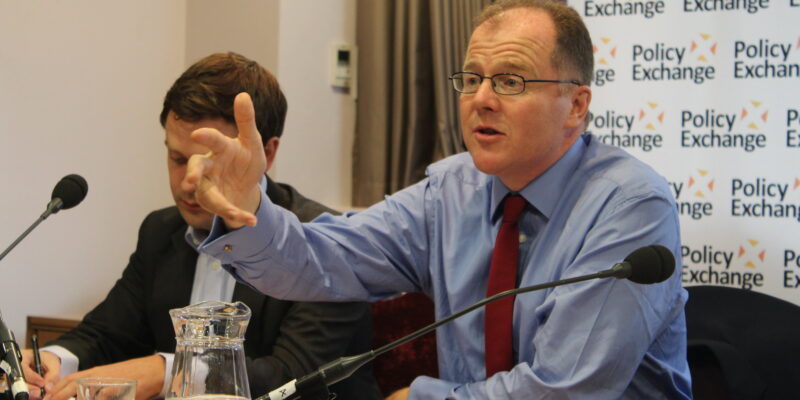Katy Hayward on the Northern Protocol: Are the UK and EU heading for a deal?
There are fears for a new breakdown in relations between the UK and EU. But away from the rhetoric, are there signs that an agreement could be struck? Brexit Spotlight spoke to Professor Katy Hayward, of UK in A Changing Europe and Queens University Belfast, about the state of the talks and their prospects.

Brexit Spotlight: To what extent has the Norther Ireland Protocol (NIP) already been implemented on the ground or not?
The question of what the NIP is like now is a good one, because, of course, it is operational and has been since the beginning of January this year. We did have notable difficulties at the launch point and this was seen in empty supermarket shelves and the need to adjust supply chains, and so on.
One way of thinking about this situation is that Northern Ireland (NI) is ‘ahead’ of Great Britain (GB) in experiencing the effects of hard Brexit – as the rest of the UK has delayed the introduction of import checks from the EU. However, due to the Protocol and the relationship with the EU single market for NI it creates, these effects take place at the Irish sea border with GB – not the EU border. When the TCA gave rise to a harder rather than a softer Brexit, the ending of the transition period saw these effects come into play down the Irish Sea come 1 January.
For a project led by my colleague Professor David Phinnemore, who is also at Queens University Belfast, we’ve been running stakeholder workshops over the last nine months. In these forums, businesses have been telling us, “actually, we have adjusted. The UK government’s means of enabling us to accommodate these new arrangements are beginning to work.”. These are things like the Trader Support Service, the Movement Assistance Scheme, and so on. They are working much more smoothly than at the outset – and businesses and officials are both getting used to these procedures.
However, we haven’t yet seen the full implementation of the NIP. As was initially negotiated at the end of December, there are the ‘grace periods’ (e.g. implementation of EU rules and checks on chilled meats, human and veterinary medicines, agri-food, etc.,). It is quite clear that if these were to be activated overnight, NI would see negative impacts quite quickly. For example, it would lead to restrictions on certain medicines being sold here. Saying that, the high-profile issue of sausages wouldn’t be noticed by consumers here, because 95% of chilled meats consumed in NI are sourced locally – but the topic gathered headlines, due more to its symbolism than practical effect.
Brexit Spotlight: The EU have made a series of what look on the face of it to be quite big concessions. How significant are they and will they be sufficient to reach an agreement?
You might be surprised to hear me say this, but my sense is that the atmosphere has been improving amongst officials in the talks. The two sides have a clear sense of what the other is proposing, they are meeting face-to-face and both have presented their proposals.
The UK and EU actually agree on what the four main areas of concern are. First, GB-to-NI customs paperwork. The EU recognises that the burden is too much. There are specific problems for small businesses managing this, as well as for large supermarkets. Second, they recognise adjustments are needed on agrifood. If the grace period was to immediately end without a new agreement, every lorry entering Belfast harbour carrying, for example, tomatoes and citrus fruits would need to be checked before allowing the products onwards entry. This is recognised as simply not workable. Third, they agree that an arrangement is required on medicines. And, fourth, they recognise there are issues with governance, i.e., the institutional arrangements that manage the UK-EU relationship and, in principle, provide NI with a say over how the NIP is implemented.
Brexit Spotlight: What are the Unionist objections to the Northern Irish Protocol? And how does this connect (if at all) to the points Brexit minister, Lord David Frost, has made in his Lisbon speech regarding European Court of Justice (ECJ) oversight?
The issue of ECJ jurisdiction and its relationship to the governance question is a big area of disagreement. It shows that both parties, the UK and EU, have very different conceptions of how they think the NIP should be run and managed.
The EU recognise there is a need for some engagement with NI institutions, as well as business and civil society here. This comes at a time, when institutions in NI are under pressure, in part because of Unionist objection to the NIP and its broad logical implication that NI will have an increasingly close economic relationship to the Republic of Ireland. The relatively new leader of the DUP, Jeffrey Donaldson, has said he is willing to step out of power-sharing (and so collapse the Stormont executive), if he is not happy with what the EU are proposing or what the UK-EU together ultimately agree to.
In the DUP’s demands on the talks, there is actually no reference in that to the ECJ jurisdiction. You do sometimes hear this argument from Unionist politicians. But they do not tend to go into the detail. For them, as well as Lord Frost, it is the principle, rather than the technical implications, which matter, i.e., the ECJ should simply not have any form of jurisdiction over NI. While there is a fear in the public discussion that Frost’s demands on the ECJ make a deal impossible, I would be more optimistic than that. For most Unionists ECJ jurisdiction is not a red line, and there is potential for an agreement. But it cannot be assumed that it will happen this side of Christmas.
October 28, 2021
Brexit Spotlight is run by Another Europe Is Possible. You can support this work by joining us today. The website is a resource to encourage debate and discussion. Published opinions do not necessarily represent those of Another Europe.





